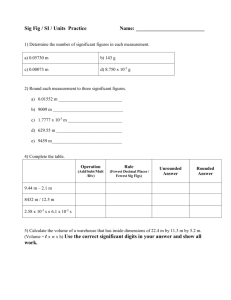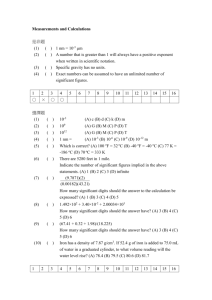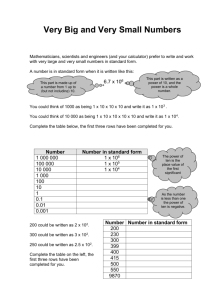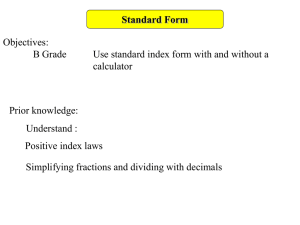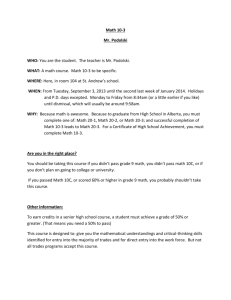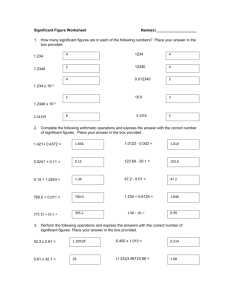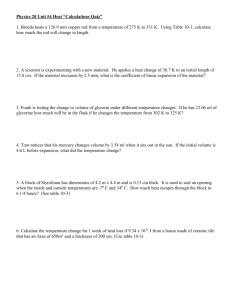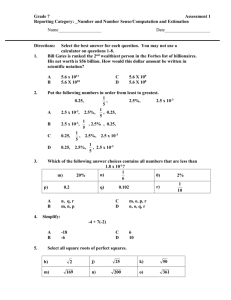Numerical Simulations of the MRI: the Effect of Dissipation Coefficients
advertisement
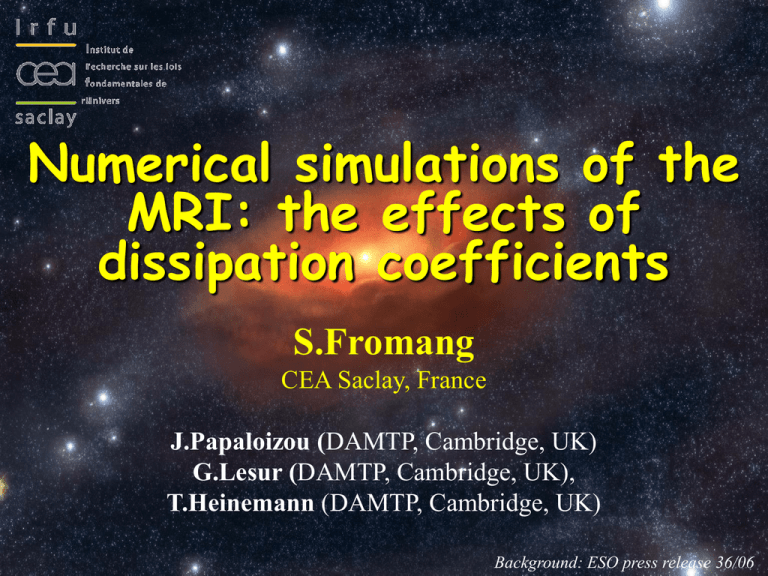
Numerical simulations of the MRI: the effects of dissipation coefficients S.Fromang CEA Saclay, France J.Papaloizou (DAMTP, Cambridge, UK) G.Lesur (DAMTP, Cambridge, UK), T.Heinemann (DAMTP, Cambridge, UK) Background: ESO press release 36/06 Setup The shearing box (1/2) • Local approximation • Code ZEUS (Hawley & Stone 1995) • Ideal or non-ideal MHD equations • Isothermal equation of state • vy=-1.5x • Shearing box boundary conditions • (Lx,Ly,Lz)=(H,H,H) z H y x H Magnetic field configuration Zero net flux: Bz=B0 sin(2x/H) z x Net flux: Bz=B0 The shearing box (2/2) Transport diagnostics • Maxwell stress: TMax=<-BrB>/P0 • Reynolds stress: TRey=<vrv>/ P0 • =TMax+TRey Small scale dissipation • Reynolds number: Re =csH/ • Magnetic Reynolds number: ReM=csH/ • Magnetic Prandtl number: Pm=/ The issue of convergence Fromang & Papaloizou (2007) Code ZEUS Zero net flux (Nx,Ny,Nz)=(64,100,64) Total stress: =4.2 10-3 (Nx,Ny,Nz)=(128,200,128) Total stress: =2.0 10-3 (Nx,Ny,Nz)=(256,400,256) Total stress: =1.0 10-3 The decrease of with resolution is not a property of the MRI. It is a numerical artifact! Numerical dissipation Numerical resisitivity (Nx,Ny,Nz)=(128,200,128) No explicit dissipation included Fourier Transform and dot product with the FT magnetic field: =0 (steady state) Balanced by numerical dissipation (k2B(k)2) ReM~30000 (~ Re) Residual -k2B(k)2 BUT: numerical dissipation depends on the flow itself in ZEUS… Pm=/=4, Re=3125 (Nx,Ny,Nz)=(128,200,128) Explicit dissipation balanced by numerical dissipation Statistical issues at large scale Maxwell stress: 7.4 10-3 Reynolds stress: 1.6 10-4 Total stress: =9.1 10-3 Residual -k2B(k)2 Varying the resolution (Nx,Ny,Nz)=(64,100,64) (Nx,Ny,Nz)=(128,200,128) (Nx,Ny,Nz)=(256,400,256) Maxwell stress: 6.4 10-3 Reynolds stress: 1.6 10-3 Total stress: = 8.0 10-3 Maxwell stress: 7.4 10-3 Reynolds stress: 1.6 10-3 Total stress: =9.1 10-3 Maxwell stress: 9.4 10-3 Reynolds stress: 2.1 10-3 Total stress: =1.1 10-2 Residual -k2B(k)2 Good agreement but… Numerical & explicit dissipation comparable! Code comparison: Pm=/=4, Re=3125 Fromang et al. (2007) ZEUS PENCIL CODE SPECTRAL CODE NIRVANA ZEUS : =9.6 10-3 (resolution 128 cells/scaleheight) NIRVANA : =9.5 10-3 (resolution 128 cells/scaleheight) SPECTRAL CODE: =1.0 10-2 (resolution 64 cells/scaleheight) PENCIL CODE : =1.0 10-2 (resolution 128 cells/scaleheight) Good agreement between different numerical methods Code comparison: Pm=/=4, Re=3125 Fromang et al. (2007) ZEUS NIRVANA PENCIL CODE RAMSES SPECTRAL CODE =1.4 10-2 (resolution 128 cells/scaleheight) ZEUS : =9.6 10-3 (resolution 128 cells/scaleheight) NIRVANA : =9.5 10-3 (resolution 128 cells/scaleheight) SPECTRAL CODE: =1.0 10-2 (resolution 64 cells/scaleheight) PENCIL CODE : =1.0 10-2 (resolution 128 cells/scaleheight) Good agreement between different numerical methods Zero net flux: parameter survey Flow structure: Pm=/=4, Re=6250 (Nx,Ny,Nz)=(256,400,256) Density Vertical velocity By component QuickTime™ et un décompresseur codec YUV420 sont requis pour visionner cette image. Velocity Movie: B field lines and density field (software SDvision, D.Polmarede, CEA) Magnetic field Schekochihin et al. (2007) Large Pm case Effect of the Prandtl number (Lx,Ly,Lz)=(H,H,H) (Nx,Ny,Nz)=(128,200,128) Take Rem=12500 and vary the Prandtl number…. Pm=/=4 Pm=/= 8 Pm=/= 16 Pm=/= 2 Pm=/= 1 increases with the Prandtl number No MHD turbulence for Pm<2 Pm=/=4 Re=3125 Re=6250 (Nx,Ny,Nz)=(128,200,128) (Nx,Ny,Nz)=(256,400,256) Total stress =9.2 ± 2.8 10-3 Total stress =7.6 ± 1.7 10-3 Pm=4, Re=12500 (Nx,Ny,Nz)=(512,800,512) BULL cluster at the CEA ~500 000 CPU hours (~60 years) 1024 CPUs (out of ~7000) 2106 timesteps 600 GB of data Total stress =2.0 ± 0.6 10-2 No systematic trend as Re increases… Power spectra Re=3125 Re=6250 Kinetic energy Magnetic energy Re=12500 Summary: zero mean field case Fromang et al. (2007) • Transport increases with Pm • No transport when Pm≤1 • Behavior at large Re, ReM? Transition Pm=4 ~4.510-3 Pm=3 Pm=2.5 (Lx,Ly,Lz)=(H,H,H) (Nx,Ny,Nz)=(128,200,128) Re=3125 Vertical net flux The mean field case Lesur & Longaretti (2007) Critical Pm? Sensitivity on Re, ? max min 1 - Pseudo-spectral code, resolution: (64,128,64) - (Lx,Ly,Lz)=(H,4H,H) - =100 Pm Flow structure Pm=/>>1 Pm =/ <<1 Viscous length >> Resistive length Viscous length << Resistive length vz Velocity Re=800 Bz Magnetic field Schekochihin et al. (2007) vz Velocity Re=3200 Bz Magnetic field Schekochihin et al. (2007) Relation to the MRI modes Growth rates of the largest MRI mode No obvious relation between and the MRI linear growth rates Conclusions & open questions • Include explicit dissipation in local simulations of the MRI: resistivity AND viscosity Zero net flux AND nonzero net flux an increasing function of Pm Behavior at large Re is unclear Pm MHD turbulence No turbulence ?Re Critical Pm? Sensitivity on Re, ? max min 1 Pm • Vertical stratification? Compressibility (see poster by T.Heinemann)? • Global simulations? What is the effect of large scales? • Is brute force the way of the future? Numerical scheme? • Large Eddy simulations?
